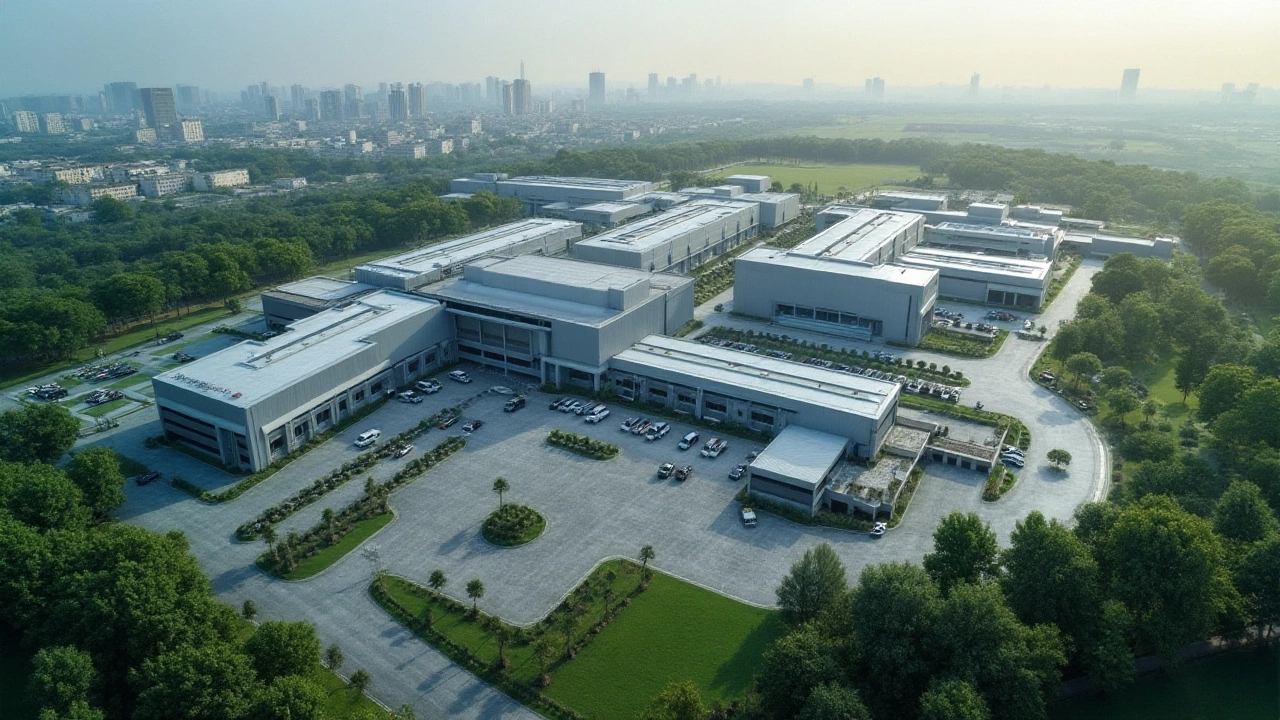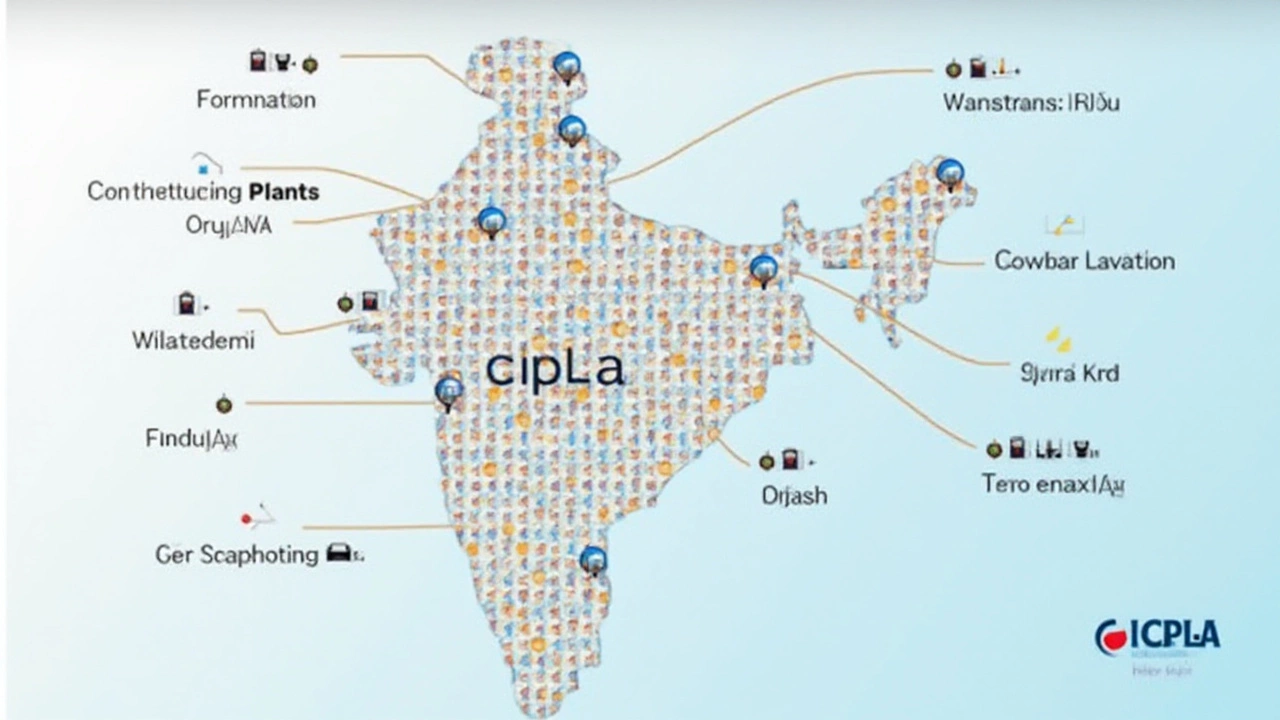 Nov, 30 2024
Nov, 30 2024
Cipla, a towering force in the pharmaceutical world, has carved a niche for itself not just in India but across the globe. The reach and impact of its operations are largely facilitated by its strategic network of manufacturing plants scattered across the Indian subcontinent. These plants form the backbone of Cipla's mission to provide access to high-quality medicines worldwide.
These manufacturing facilities are not just random structures; they symbolize precision and commitment to quality. By exploring the geographic and functional spread of Cipla plants in India, we get a clearer picture of how this pharma giant functions so efficiently. Each plant has been thoughtfully directed towards specific manufacturing needs, catering to different therapeutic sectors and ensuring seamless operations.
As we dive deeper into the specifics, we'll uncover where these plants are located, what unique production processes are undertaken at each site, and what future expansions are in the pipeline. This exploration not only highlights Cipla's current capabilities but also its path forward in the dynamic pharmaceutical landscape, ensuring its position as an industry leader remains unchallenged.
- Overview of Cipla in India
- Major Manufacturing Locations
- Specializations of Each Plant
- Future Expansion Plans
Overview of Cipla in India
In the grand tapestry of the pharmaceutical industry, Cipla stands out as a pioneering and transformative force. Founded in 1935, it's a name synonymous with drug innovation and accessibility, championing the cause of making medicines affordable for everyone. With a robust presence in India, Cipla has catalyzed numerous advancements in healthcare both locally and globally. Cipla's mission is centered around re-imagining healthcare to ensure affordable and accessible care to all in need, a mission that resonates deeply across India's diverse populace.
From the sprawling urban landscapes to the quieter rural terrains of India, Cipla's reach has been expansive and impactful. The company boasts a multitude of plants dotted across various states, each engineered to accomplish specific production tasks. This geographically diverse network aids Cipla not only in optimizing the distribution of pharmaceutical products but also in minimizing logistical challenges that come with serving such a vast market. The presence of these plants is pivotal in enhancing the company's operational efficiency, allowing it to cater swiftly to both domestic and international demand.
Cipla houses a wide range of manufacturing capabilities, notably including Active Pharmaceutical Ingredients (APIs) and finished formulations across a plethora of therapeutic genres. From respiratory to antivirals, Cipla's catalog is rich and diverse, asserting its dominance in segments like respiratory and anti-infectives. What's more, Cipla's commitment to sustainability is evident in its continuous investment in environmentally-friendly practices and technologies, reflecting its conscientious approach to manufacturing.
According to a report by the Indian Pharmaceutical Alliance, Cipla’s cohesive strategy and commitment to quality have propelled it to a leadership position in the respiratory segment in India and certain international markets. A testament to its strong foothold in the industry is its continued accreditation by international regulatory bodies.
Rajesh Toshniwal, a notable figure in the pharma landscape, once stated, "Cipla has set benchmarks not just in terms of quality but also in the integration of socially conscious values into the heart of its operations." The statement reflects the ethos that defines Cipla’s approach to manufacturing and business ethics.
A commendable aspect of Cipla’s operations is its foresight in leveraging technology and innovation. The firm invests heavily in Research and Development (R&D) to bring forth next-generation drugs aimed at satisfying unmet medical needs. Regular advancements in drug delivery systems are credited to Cipla’s dedicated R&D team, who relentlessly pursue excellence and innovation. Notably, Cipla’s collaboration with academic and research institutions worldwide further bolsters its capacity to innovate.
Stepping into the future, Cipla is poised for further expansion both in the domestic and international markets. With India emerging as a hub for pharmaceutical manufacturing on account of its skilled workforce and cost-efficiency, Cipla is strategically positioned to capitalize on these advantages. The recent acquisition of cutting-edge technologies and the establishment of new facilities underscore Cipla's commitment to enhancing its manufacturing prowess.

Major Manufacturing Locations
In the vast expanse of India's landscape, Cipla has strategically planted its roots in various regions, creating a robust and efficient network of manufacturing facilities. Each location has been meticulously chosen to optimize logistics and production efficiency, reflecting Cipla's commitment to producing high-quality pharmaceuticals. Cipla plants in India not only serve local markets but also support the global demand for life-saving medications. One of the most significant sites is in Maharashtra, where several facilities are dedicated to different aspects of pharmaceutical manufacturing such as formulations and active pharmaceutical ingredients (APIs).
The Goa plant is another jewel in Cipla's crown, known for its cutting-edge technology and stringent quality control measures. This plant focuses heavily on export-oriented formulations, thus playing a pivotal role in feeding Cipla's international business appetite. Alongside this, the robust infrastructure in Karnataka houses some of Cipla's key formulation and development processes. It's interesting to note how Cipla's operation strategy harmonizes with India's diverse industrial landscape.
Moreover, the presence in Indore, Madhya Pradesh, expands Cipla's reach in central India, making medication distribution within the country more effective. The Indore facility is reputed for its large-scale production capabilities, particularly in respiratory medications, contributing extensively to Cipla's profile in respiratory therapy. A fact worth mentioning is Cipla's collaboration with local talent and resources, which enriches its innovative potential and efficiency.
Cipla’s Former Executive Director, Amar Lulla once quoted, “Our manufacturing sites in India are our greatest strength. They allow us to innovate, scale, and reach corners of the world we never thought possible.”This sentiment resonates as Cipla continually improves and expands its infrastructure to meet the evolving demands of healthcare across continents. Recent years have seen the establishment of a facility in Sikkim, which is part of the company's vision to optimize production closer to the north-eastern markets and enhancing accessibility.
The scale of operations is evident from the fact that Cipla also leverages its facility in Baddi, Himachal Pradesh, where productivity meets sustainability. Here, production is integrated with eco-friendly practices, setting a benchmark for pharmaceutical manufacturing standards. Through each of these strategically placed plants, Cipla not only rivals its competitors in terms of quantity but also excels in ensuring quality, innovation, and environmental stewardship.

Specializations of Each Plant
Understanding the specialization of each Cipla manufacturing plant can provide insight into how the company maintains its high standards and efficiency. Each facility is designed to excel in a specific aspect of pharmaceutical manufacturing, contributing to Cipla's diverse product portfolio. One of the primary advantages of such specialization is the optimization of production processes to cater to a wide range of therapeutic areas, ensuring that Cipla remains at the cutting edge of the pharmaceutical industry in India.
In Goa, one of Cipla's largest setups, the focus is on producing respiratory and oncology medications. This plant is outfitted with state-of-the-art technology tailored for the manufacturing of inhalation products like inhalers and nasal sprays, catering to millions around the world who rely on these medicines for chronic conditions. This specialization allows Cipla to maintain a consistent supply chain of these vital medications, making their Goa facility a linchpin in their operations.
"Our Goa plant is a cornerstone in our mission to improve lives – a place where innovation meets necessity," explained Cipla's CEO in a recent statement.
Moving to the Indore plant, the focus shifts to Active Pharmaceutical Ingredients (APIs). This location is a powerhouse for producing key ingredients that are critical to various drug formulations. By concentrating API production in Indore, Cipla leverages economies of scale and refines its chemical synthesis processes to the highest degree. The prowess displayed here ensures that they have a self-sufficient supply of raw materials, which is crucial for both cost management and quality assurance.
Additionally, Cipla’s Patalganga and Kurkumbh units cater extensively to antibiotic and antiviral drug production. These plants have specialized lines for producing both generic and branded formulations which are exported globally. Their rigorous quality assessments and adherence to global standards make them noteworthy. Cipla’s emphasis on antibiotics is especially relevant given the rising concerns about antibiotic resistance, a field where the company is striving to make impactful contributions.
Pharma manufacturing in India is also underscored by Cipla's focus on expanding its biosimilar capabilities in Bengaluru. Here, the company delves into developing affordable biopharmaceuticals which mimic original biological drugs, offering significant cost savings. The expertise required in biotech manufacturing is substantial, and Cipla ensures that its Bengaluru facility meets this demand with a highly skilled workforce and cutting-edge equipment.
In a bid to remain agile amidst the evolving pharmaceutical landscape, each of these specialized plants works with coordination akin to an orchestra, where each note played must resonate perfectly with the other. This harmonious operation ensures that Cipla not only meets the current demands but also anticipates future needs through forward-thinking expansions and innovations, further entrenching their standing as a leader in the sector.

Future Expansion Plans
As Cipla looks to the future, its plans for expansion are both ambitious and inspiring. The pharmaceutical industry's rapid advancements, coupled with increased global demand for effective and affordable medications, have set the stage for Cipla to further scale its operations. The company has already announced several strategic moves, aiming to bolster its production capacities and innovation capabilities, particularly in India, where it has a strong foothold. This is a continuation of Cipla's commitment to staying at the forefront of the pharmaceutical sector, ensuring that it can meet the needs of an ever-growing patient population.
One of the major drivers of Cipla's expansion plan is its focus on enhancing the capacity of its existing Cipla plants in India. By upgrading technology and increasing automation, Cipla aims to not only boost production efficiency but also ensure that its products meet the highest standards of quality. This aligns with the global trend of integrating advanced technology into pharmaceutical manufacturing, which is crucial for maintaining competitive advantage. A representative of the company mentioned,
"Investing in our plants means investing in the health of millions. We aspire to reach new heights in delivering reliable and innovative therapies to the world."
A key initiative within Cipla's expansion strategy is its increased focus on research and development. By setting up new state-of-the-art R&D facilities, Cipla plans to accelerate drug discovery and development processes, thus shortening the time to market for new drugs. This move not only boosts their portfolio but also fits their vision of making significant contributions to healthcare through innovation. The allocation of substantial resources towards R&D signifies the company’s dedication to addressing unmet medical needs efficiently.
Furthermore, Cipla is exploring expansion via strategic partnerships and collaborations. By entering joint ventures with local and global entities, Cipla aims to leverage complementary strengths, enhancing its ability to introduce high-quality products in new markets. These partnerships are not solely about distribution but also involve co-developing new formulations and biosimilars, which are becoming increasingly significant in the pharmaceutical landscape. This balanced approach of ‘build’ and ‘collaborate’ underscores Cipla's relentless pursuit of excellence.
The company's expansion plans also envision tapping into the rapidly growing biologics sector. Biologics, known for their transformative impact in treating complex diseases, have become a focal point for pharmaceutical companies worldwide. Cipla's investment in biologics reflects its understanding of the evolving market dynamics and patient needs. Additionally, Cipla is keen on pioneering environmental sustainability. With newer plants designed to minimize carbon footprints and waste, Cipla is committed to greener practices that align with global sustainability goals. Pharma manufacturing in India is increasingly pivotal not just to Cipla but to the global supply chain, requiring responsible stewardship from corporations.